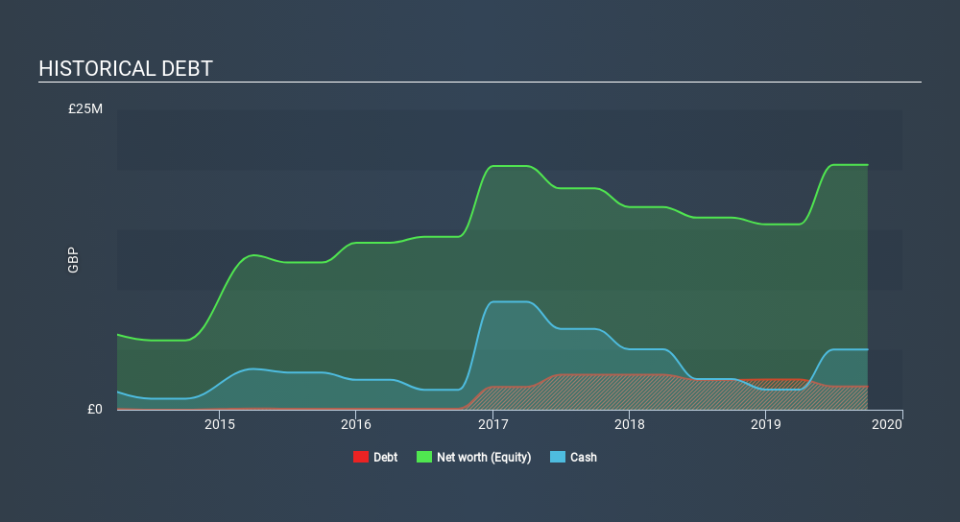Is Collagen Solutions (LON:COS) Using Too Much Debt?

Legendary fund manager Li Lu (who Charlie Munger backed) once said, 'The biggest investment risk is not the volatility of prices, but whether you will suffer a permanent loss of capital. When we think about how risky a company is, we always like to look at its use of debt, since debt overload can lead to ruin. Importantly, Collagen Solutions plc (LON:COS) does carry debt. But is this debt a concern to shareholders?
Why Does Debt Bring Risk?
Debt and other liabilities become risky for a business when it cannot easily fulfill those obligations, either with free cash flow or by raising capital at an attractive price. Part and parcel of capitalism is the process of 'creative destruction' where failed businesses are mercilessly liquidated by their bankers. However, a more common (but still painful) scenario is that it has to raise new equity capital at a low price, thus permanently diluting shareholders. By replacing dilution, though, debt can be an extremely good tool for businesses that need capital to invest in growth at high rates of return. When we examine debt levels, we first consider both cash and debt levels, together.
See our latest analysis for Collagen Solutions
What Is Collagen Solutions's Debt?
You can click the graphic below for the historical numbers, but it shows that Collagen Solutions had UK£1.94m of debt in September 2019, down from UK£2.48m, one year before. However, it does have UK£5.01m in cash offsetting this, leading to net cash of UK£3.07m.
A Look At Collagen Solutions's Liabilities
Zooming in on the latest balance sheet data, we can see that Collagen Solutions had liabilities of UK£3.06m due within 12 months and liabilities of UK£529.6k due beyond that. Offsetting this, it had UK£5.01m in cash and UK£1.60m in receivables that were due within 12 months. So it actually has UK£3.02m more liquid assets than total liabilities.
It's good to see that Collagen Solutions has plenty of liquidity on its balance sheet, suggesting conservative management of liabilities. Given it has easily adequate short term liquidity, we don't think it will have any issues with its lenders. Simply put, the fact that Collagen Solutions has more cash than debt is arguably a good indication that it can manage its debt safely. When analysing debt levels, the balance sheet is the obvious place to start. But ultimately the future profitability of the business will decide if Collagen Solutions can strengthen its balance sheet over time. So if you're focused on the future you can check out this free report showing analyst profit forecasts.
Over 12 months, Collagen Solutions reported revenue of UK£4.4m, which is a gain of 19%, although it did not report any earnings before interest and tax. We usually like to see faster growth from unprofitable companies, but each to their own.
So How Risky Is Collagen Solutions?
By their very nature companies that are losing money are more risky than those with a long history of profitability. And we do note that Collagen Solutions had negative earnings before interest and tax (EBIT), over the last year. And over the same period it saw negative free cash outflow of UK£2.8m and booked a UK£1.6m accounting loss. However, it has net cash of UK£3.07m, so it has a bit of time before it will need more capital. Overall, its balance sheet doesn't seem overly risky, at the moment, but we're always cautious until we see the positive free cash flow. When analysing debt levels, the balance sheet is the obvious place to start. But ultimately, every company can contain risks that exist outside of the balance sheet. For instance, we've identified 4 warning signs for Collagen Solutions that you should be aware of.
When all is said and done, sometimes its easier to focus on companies that don't even need debt. Readers can access a list of growth stocks with zero net debt 100% free, right now.
If you spot an error that warrants correction, please contact the editor at editorial-team@simplywallst.com. This article by Simply Wall St is general in nature. It does not constitute a recommendation to buy or sell any stock, and does not take account of your objectives, or your financial situation. Simply Wall St has no position in the stocks mentioned.
We aim to bring you long-term focused research analysis driven by fundamental data. Note that our analysis may not factor in the latest price-sensitive company announcements or qualitative material. Thank you for reading.

 Yahoo Finance
Yahoo Finance 
